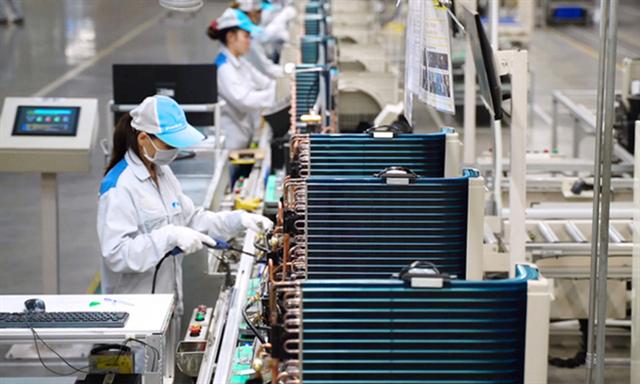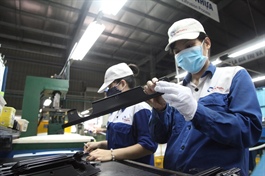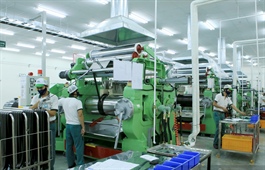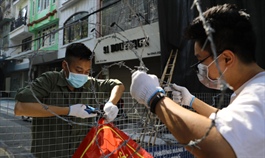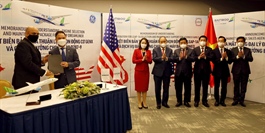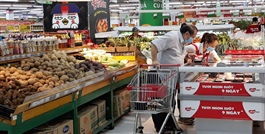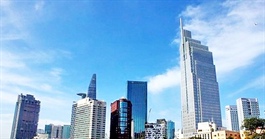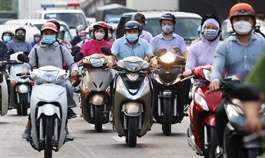Covid restrictions sour Vietnam for foreign investors
Covid restrictions sour Vietnam for foreign investors
Foreign companies are now looking to leave Vietnam, once a favored destination, after the fourth wave of Covid-19 halted production.
Workers at an air conditioner making factory in northern Hung Yen Province. Photo by VnExpress/Vien Thong
|
For the first time last year Vietnam was among the world’s top 20 economies in attracting FDI as $16 billion poured in though globally the figures fell by double digits.
The country was hailed as a success story in controlling Covid, which helped it attract companies shifting out of China.
However, the Delta variant and the restrictions imposed for the last several months have caused the situation to sour for many foreign companies, making them reconsider their plans.
Twenty percent of American companies had shifted part of their production out of Vietnam as of mid-August, a survey by the American Chamber of Commerce in Vietnam (AmCham Vietnam) has found.
Besides, half the respondents were operating at less than 50 percent capacity and 13 percent had temporarily closed down.
The European Chamber of Commerce in Vietnam also said 20 percent of its members had shifted part of their production overseas.
BritCham Vietnam chairman Chris Jeffery said: "British manufacturing firms, alongside other foreign enterprises, have taken actions to move orders out of Vietnam to other countries and arrange vaccinations for their workers to deal with another two-week restriction period."
Many are struggling to transport raw materials from one province to another, and importing and exporting products, he told VnExpress International.
Some companies have started shipping products to Europe from Cambodia instead of Vietnam, he added.
Garment companies have been among the worst hit.
AmCham Vietnam vice president John Rockhold said the sector has been among the most affected by the fourth wave since around the world people are resuming shopping.
They cannot sustain further long periods of restrictions, he warned.
"If Vietnam extends its restrictions for another month, definitely companies will pick up and leave," he said, referring to the recent 15-day extension of social distancing in HCMC.
But the manufacturing troublesseem set to continuein the fourth and holiday quarter and probably the first half of next year, research firm BTIG analyst Camilo Lyon said in a note to clients.
"Many brands have proactively cut orders in anticipation of capacity constraints and backlogs once factories are back up and running post-lockdown," the U.S.’s CNBC TV channel quoted Lyon as saying.
"Many larger brands have moved or attempted to move some production to other countries."
During a presentation with investors last week, Designer Brands CEO Roger Rawlins said he spoke to another industry CEO who told him that because of the slowdown in Vietnam, six years of supply chain work was undone in six days.
Nike is an example. Some analysts have cut their outlook for its sales, predicting that lockdowns and factory closures in Vietnam, where about half of all Nike footwear is manufactured, will cause shortages during the crucial shopping season.
"We believe the risk of significant cancellations beginning this holiday and running through at least next spring has risen materially for Nike as it is now facing at least two months of virtually no unit production at its Vietnamese factories," BTIG analysts wrote in a note.
Takeo Nakajima, chief representative of the Japan External Trade Organization in Hanoi, said the Covid recovery map has changed quickly, pointing out that Indonesia looked very negative two months ago but currently outperforms Vietnam.
"Too strict preventive measures" have become the new risks for Japanese companies’ operation in Vietnam, Nakajima, who is also the vice chairman of the Japanese Chamber of Commerce and Industry in Vietnam, said.
Some analysts are even concerned that Vietnam could lose its position in global supply chains.
Vu Tu Thanh, deputy regional managing director and Vietnam representative of the U.S.-ASEAN Business Council, said the biggest risk Vietnam faces is being considered by large companies as only a supplemental production location and not a strategic one.
The Covid situation has changed for the better, but there has not been much improvement in relaxing restrictions, which sends a negative message to businesses, he said.
The impact of the fourth wave could make it difficult for companies in billion-dollar export sectors such as electronics, footwear, garments, and wood products to maintain their previous commitment in the country.
But some analysts see the recent shifting of FDI as merely temporary.
Jeffery of BritCham said the recent decision by some British companies to move orders out of Vietnam is only a temporary solution, and they want a comprehensive Covid-recovery strategy from the government.
To retain foreign companies the government needs to have a clear and straightforward road map for easing lockdown restrictions and removing the obstacles to trade and commerce, he said.
Andrew Jeffries, the Asian Development Bank’s country director for Vietnam, said companies have been ordering products from other locations but not moved out of Vietnam.
The ADB remains bullish on the country’s prospects in the medium and long terms, he said.
Growth could be aided by a revival of domestic demand, acceleration in public spending and an expansion to new export markets thanks to the numerous free trade agreements Vietnam is part of and expected global economic recovery, he added.
The Australian Chamber of Commerce Vietnam is not aware of members looking to exit Vietnam though many are certainly feeling the pressure to do so, its executive director, Simon Fraser, said.
Australian businesses understand the need to make long-term investments in Vietnam in both monetary terms and relationships, he added.


